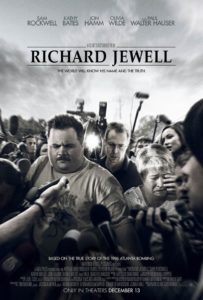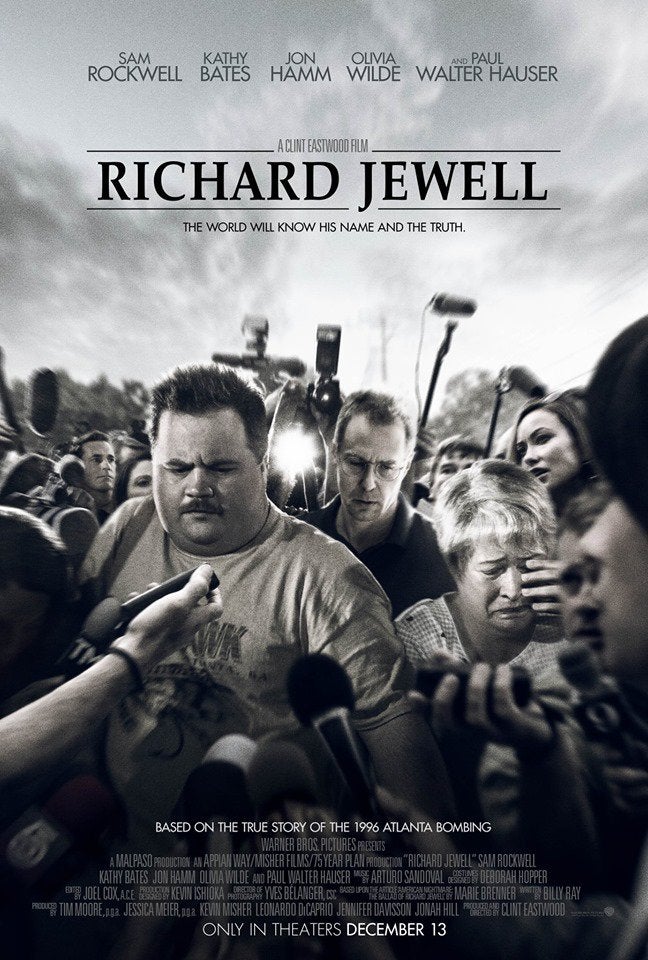 This movie hits close to home on so many levels. I was living in Atlanta in 1996, freelancing in news, and was even supposed to be volunteering as a pseudo security guard at Centennial Park on the night of the bombing. I still have the uniform, though I never “served” – opting instead for a paid gig with NBC NewsChannel, helping local affiliates cover the Olympics from a rooftop about a half-mile away from the park. I remember getting home from work after midnight, turning on the TV and a short time later, hearing about the bombing. I remember transitioning from NBC to CNN when the Games ended. I remember the media frenzy surrounding Richard Jewell, who lived with his mother in an apartment complex off Buford Highway, close to my favorite bowling alley. I don’t remember to what extent I believed or shared the details about Richard Jewell’s alleged role in the bombing. But I do recall having great faith in our sources at the FBI and ATF, and in the reporting of our hometown paper, the Atlanta Journal-Constitution. They all said he did it. He didn’t.
This movie hits close to home on so many levels. I was living in Atlanta in 1996, freelancing in news, and was even supposed to be volunteering as a pseudo security guard at Centennial Park on the night of the bombing. I still have the uniform, though I never “served” – opting instead for a paid gig with NBC NewsChannel, helping local affiliates cover the Olympics from a rooftop about a half-mile away from the park. I remember getting home from work after midnight, turning on the TV and a short time later, hearing about the bombing. I remember transitioning from NBC to CNN when the Games ended. I remember the media frenzy surrounding Richard Jewell, who lived with his mother in an apartment complex off Buford Highway, close to my favorite bowling alley. I don’t remember to what extent I believed or shared the details about Richard Jewell’s alleged role in the bombing. But I do recall having great faith in our sources at the FBI and ATF, and in the reporting of our hometown paper, the Atlanta Journal-Constitution. They all said he did it. He didn’t.
Oops doesn’t quite cut it.
Richard Jewell goes a long way in restoring Jewell’s status as security-guard hero rather than prime suspect. But it’s (a lot) too little, too late. Jewell died in 2007, at age 44. The film is both a tragedy and a cautionary tale about groupthink, profiling, the relationship between the media and law enforcement, and the dangers of a rush to judgment. That’s not to say Richard Jewell is a perfect film. It isn’t.
Director Clint Eastwood is a bit heavy-handed in his recrimination of law enforcement and journalists, particularly Atlanta Journal-Constitution reporter Kathy Scruggs (Olivia Wilde), portrayed as a floozy and boozy crime-beat reporter who is not above seducing her sources (most notably a composite character played by Jon Hamm) to get a scoop. Scruggs is not alive to defend herself, so the AJC is doing so on her behalf, imploring the filmmakers to add a disclaimer about the use of dramatic and creative license in depicting particular people and events. Her character is redeemed somewhat by the end, but I don’t think it was fair of Eastwood to call out Scruggs by name, while making the FBI character who leaks information a “composite”. The controversy over Scruggs’ character only serves to overshadow what – and who – the movie is meant to be about.
The heart of the film rests within the character of Richard Jewell (Paul Walter Hauser) and his relationships with his greatest defenders – his mother (Kathy Bates) and his lawyer (Sam Rockwell). Hauser – probably best known for his supporting role as Tonya Harding’s doofus bodyguard in the 2017 dark comedy I, Tonya – does a great job capturing the essence of Jewell and the traits that were his undoing in the eyes of law enforcement and the public. Bates and Rockwell are – as always – simply superb.
My biggest fear with the movie is that it could feed into Donald Trump’s misguided and dangerous “Fake News” diatribe. It paints a pretty ugly portrait of law enforcement and journalists. I agree their relationship can be too cozy, with both sides using each other to some degree. But for every misstep, there are countless cases in which the relationship, flawed as it may be, does lead to the accurate dissemination of important information.
Former CNN producer (and co-worker and all-around good guy) Henry Schuster recently penned an op-ed in The Washington Post that goes a long way in explaining, acknowledging – and apologizing for – his and the media’s culpability in the sequence of events that blew Jewell’s life apart. As the movie shows, there’s plenty of blame to go around.
Ultimately, however, there’s one person who bears the brunt of responsibility and blame. And that’s Eric Robert Rudolph. Remember him? He’s the serial bomber eventually convicted of planting the deadly device that Richard Jewell found in Centennial Park. He’s also the guy who might still be roaming free – and killing people – if not for the efforts of law enforcement and the media.

